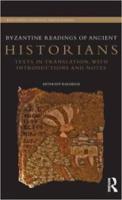
Routledge Classical Translations (2015) h/b 188pp £75 (ISBN 9780415732321)
In his introduction, K. explains ‘reception’ as the study of how texts were received and reacted to by people of different times and cultures, and thence passed on to the next point of reception. What he calls ‘weak’ reception, often a matter of mere curiosity, may produce an interesting footnote and little more. ‘Strong’ reception, on the contrary, is part of the process that delivers the texts we receive, selected, adapted, interpreted and commented on for a range of reasons, not least political, through the centuries. Bearing in mind that almost all the Greek literature we have was transmitted by Byzantine scholars, a study of what they brought to the texts should be enlightening—those texts, that is, which they chose to pass on.
The way texts are bundled can also be significant. For example, Thucydides appears (not surprisingly) alongside his biographers, whilst later many Byzantine scholars preferred to bundle according to style and rhetoric rather than historical content. Xenophon, for instance, was an admired stylist, whose Cyropaedia was used as a model for imperial panegyrics—pretty common occurrences in the Byzantine court.
The major destinations for these texts were the encyclopaedic Bibliothêkê of Photius, the Excerpta and the Souda. You can find a translation of the latter, with notes and commentary, at www.stoa.org (‘Suda-on-line’ sic). The Excerpta, a cut and paste anthology, is a source for lost histories, and the subsequent, and great, Souda plundered the Excerpta for much of its content.
In more detail, we see that the pagan historian Zosimus’ anti-Christian New History not surprisingly attracted the scholiasts’ comments. Try this for a flavour: where Zosimus says, ‘When he became sole emperor, Constantine no longer hid his malicious nature’ the scholiast adds, ‘Most wicked and truly malicious one, for what other reason are you hurling blasphemies upon that upright and most Christ-like soul, if not because he tore down your loathsome and malignant form of worship?’ There follow chapters reviewing scholia on Thucydides and Diodorus Siculus, essays on the Greek historians and a commentary on Dionysus of Halicarnassus.
Byzantium has long been viewed by classicists as the exotic, spicy end of antiquity, and not totally without justification. Here’s an all too rare opportunity for general readers to engage with the words and thoughts of the Byzantine commentators and to savour some of the atmosphere. Highly recommended, though the price tag might deter.
Adrian Spooner
